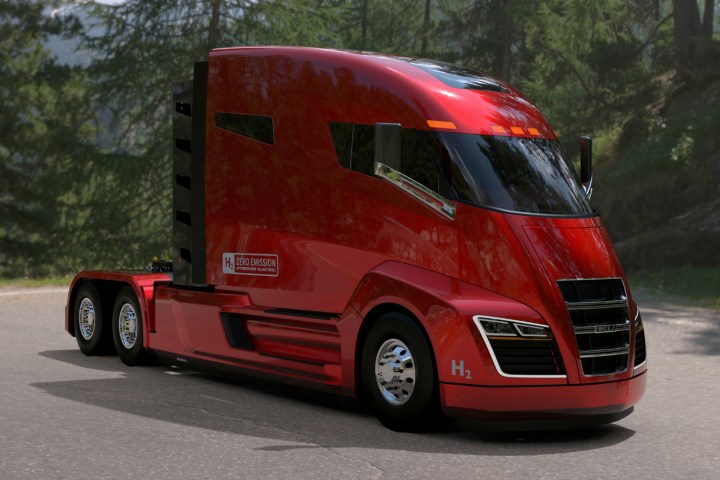
In June Nikola announced it had collected $2.3 billion worth of pre-orders (a total of over 7,000 pre-orders, some possibly multiple) on the big truck. At that time the Nikola One truck’s power was stated to come via a 320kWh lithium battery pack with a 150-gallon natural gas tank to fuel the turbine that would recharge the battery pack. The turbine set up was called a “range-extender.”
Now, according to the press release, Nikola says the actual technology details were “kept confidential pending finalization of key supplier agreements.”
Here’s the new power train, from the release: “a custom-built hydrogen-electric 800V fuel cell. Nikola’s hydrogen class 8 trucks will be more powerful than any other production diesel truck on the road and have a range of over 1,200 miles between fill-ups. It will achieve nearly 20 mpg with zero emissions under full load …”
The company claims the vehicle will have half the operating cost of diesel powered trucks. The powertrain is rated at 1,000 horsepower and 2,000-foot pounds of torque. Nikola says the truck can accelerate from zero to 60 acceleration under a full load in 30 seconds and stop with a full load in 150 feet. According to both figures cited by Nikola its truck will get up to speed in half the time and brake in half the distance of diesel trucks.
Nikola now also offers a leasing program with the rate set at $5,000 to $7,000 a month depending on options and trim. The monthly fee covers the lease payment, unlimited miles, unlimited fuel, scheduled maintenance, and a full warranty. After 72 months or 1,000,000 miles owners can trade their Nikola One in for another one at no additional cost.
In a message to people who already put down a deposit based on the previous powertrain specifications, Nikola said they’ll have their choice of buying or leasing “when we finalize the design and order with you.” All deposits are refundable, so anyone who wants to walk is able to do so at any time. The original technology depended upon access to a network of natural gas refilling stations, for which Nikola had not previously arranged.
The source for all the hydrogen? Nikola say the company is “in the process of developing multiple 100-megawatt solar farms to create hydrogren from electrolysis. Nikola will convert solar energy to hydrogen on-site using only energy and water, making it the only fuel that is zero emission from production to consumption.”
The company also announced 56 hydrogen filling stations (at first, with more to come) strategically located across the U.S. and Canada. A map of the planned stations is on the company website. The company promises the hydrogren stations will be serviced by a fleet of Nikola One trucks. The trucks will transport liquid hydrogen from the solar farms to the hydrogen stations. Like the Nikola One trucks, the solar farms and hydrogen filling stations are scheduled to be ready by 2020.
On December 1, 2016 the Nikola One will be unveiled at the company’s Salt Lake City headquarters. It will be an invite-only event, but will also be streamed online on the Nikola website. The company also stated it now has more than $3 billion pre-orders.
It remains to be seen if people who thought they were signing on for eventual delivery of trucks powered by battery backed up by natural gas, outlets for which are relatively common, will stay onboard with technology requiring solar farms and a national network of hydrogen filling stations.
While $3 billion is a lot of money, it certainly sounds like the investment necessary to build all the solar farms and hydrogen stations as well as set up a factory and production process to create the trucks in the numbers the company is speaking about will require a great deal more in investment. Nikola Motor Company is a privately held firm.
Editors' Recommendations
- Hyundai’s hydrogen fuel cell truck makes hauling freight green and glamorous
- BMW teases hydrogen cars again with fuel cell X5 concept




